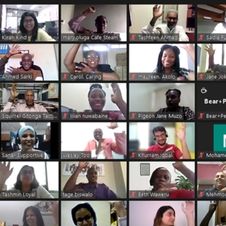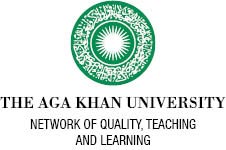The success of Teaching and Learning Enhancement (TLEW) 2021

“Most of my colleagues attended TLEW before me and all of them were full of praise of how TLEW made them gain confidence in their teaching. Attending TLEW was one of the best choices I made in my professional journey, and I can proudly say that TLEW made me a better, more confident, and more competent teacher.”
(Beth Waweru , Instructor, School of Nursing and Midwifery, Kenya)
Do not miss this wonderful learning opportunity! Click here to save your spot in our upcoming TLEW workshops.
Teaching and Learning Enhancement Workshop (TLEW) - one of the most in-demand and successful workshops offered by the Network of Quality, Teaching, and Learning, aims to support AKU faculty members to increase their competence and confidence as facilitators of learning as well as provide them with resources to be more reflective about their teaching. In 2021, QTL_net offered its eleventh TLEW workshop in which twenty-six faculty members and academic support staff participated. It was QTL_net’s second online offer of the workshop. In the last five years, QTL_net has trained 250+ AKU faculty members and staff on instructional skills, who have become a source of inspiration in their respective entities.
“As a part of an academic institute, I have been associated with teaching and learning of undergraduate and postgraduate students. Last year I had the opportunity to facilitate a workshop with another faculty who made the lesson plan in a very different way which I liked the most. On inquiring, I came to know that she has learned it from this brilliant TLEW workshop. This motivated me to take some time from my busy clinical practice and learn something new that will benefit me for the rest of my academic career” said Dr. Uzma Chishti (Assistant Professor, Medical College, Pakistan), who attended this year’s workshop.
Unlike other traditional workshops, TLEW is designed on the peer-based instructional development model that strengthens participants’ skills through intensive and practical exercises in learning-centered teaching, instructional strategies, reflective practice, and giving and receiving constructive feedback.
Ms. Carolyne Namukwaye (Senior Instructor, School of Nursing and Midwifery, Uganda) deliberated on her experience of attending TLEW as: “[During TLEW], I learned how to engage students for better learning and how to design precise lessons. I have incorporated the learning into my teaching now, and I am proud to say that I now enjoy teaching because my lessons are well planned and student-centered”
The highlight of the workshop is the three mini-lessons that provide participants with an avenue to plan their lessons using the BOPPPS model, experiment with various pedagogic approaches, and get real-time feedback in small groups.
Beth Waweru shared her valuable experience of participating in mini-lessons as, “[Through TLEW], I gained a lot of confidence in my teaching. The three mini-lessons with colleagues helped me reflect and improve on my teaching as I received constructive feedback from them and our facilitator. The facilitator created a conducive environment “safe container” for us to practice, make mistakes and learn from our mistakes without feeling embarrassed”
The multidisciplinary nature of the workshop provides participants with a unique platform to interact with faculty members across disciplines to learn about their experiences and build their repertoire of teaching and learning knowledge. Reflecting on the experiences of interacting in a multidisciplinary group,
Dr. Syed Ahsan (Assistant Professor – Medical College, Pakistan) said: “Apart from the main content, I vigilantly observed and learned from every strategy of teaching and learning being utilized by the facilitators and my colleagues to engage a diverse group of learners in this workshop.”
The six-day intensive workshop concludes with celebrating participants’ strengths, revisiting the areas of opportunity for growth, and deliberating a way forward on how these skills can best be incorporated into the classroom.
Dr. Uzma Chishti reflected on her experience of attending TLEW and said, “This workshop was an eye-opener. [previously] we were doing everything but in a traditional way. TLEW emphasizes every step of a lesson plan separately like a bridge in, learning outcomes, pre-assessment, participatory plan, post-assessment, and summary. I believe this clarified concept makes it easy to make a lesson plan without missing any important aspects. Now I love to make all the lesson plans on the BOPPPS model.”


